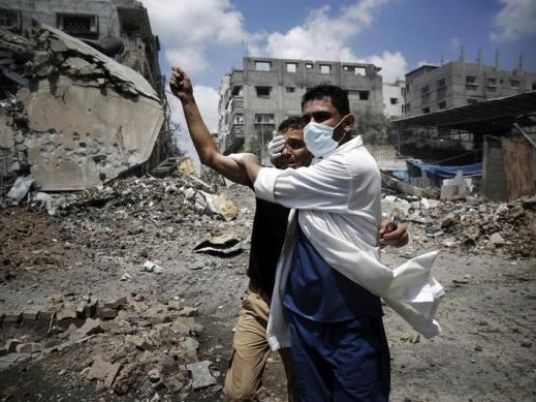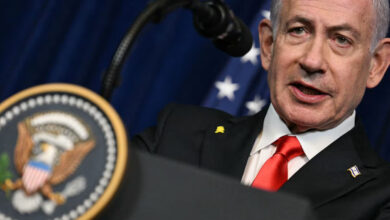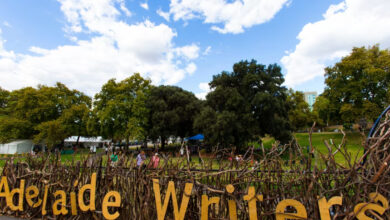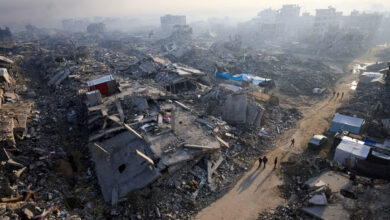
Gaza militants fired a barrage of rockets at Israel on Friday as Palestinian factions at talks in Cairo refused to extend a 72-hour ceasefire in the devastating month-long conflict.
But negotiations for a new truce were still ongoing in the Egyptian capital, as residents in southern Israel took shelter from the rockets and Gazans were fleeing their homes in fear of Israeli retribution.
The Israeli army said at least 10 rockets had targeted the south of the country, with one intercepted over the coastal city of Ashkelon. Police said they caused no harm or damage.
The projectiles were fired shortly after 0500 GMT, when the 72-hour ceasefire in four weeks of fighting in and around Gaza reached its end after Palestinian factions refused to extend it.
"All the Palestinian factions, including Hamas, have agreed not to renew the ceasefire because (Israel) is refusing to accommodate our demands, but negotiations continue in Cairo," Hamas spokesman Fawzi Barhum told AFP.
A Palestinian official said Gaza's de facto rulers Hamas and the Islamic Jihad, a smaller faction also at the Egypt-led talks, had agreed a ceasefire but then there was an alteration in wording of an agreement regarding the Israeli blockade on Gaza.
The official said members of the Palestinian delegation to the talks, which is led by a representative of Palestinian president Mahmud Abbas, would meet after noon to assess their stance.
Israeli Prime Minister Benjamin Netanyahu had no immediate comment on the latest developments, but a member of his cabinet warned of a "harsh" reaction to the rocket fire.
"Israel must immediately return its delegation from Egypt, we cannot hold talks under threat — the firing at Israeli civilians as a pressure means," said Bennett, a member of the security cabinet.
"This is a test for Israeli deterrence, the reaction must be harsh."
But despite the warning, there was no immediate Israeli retaliation in Gaza, an AFP correspondent and witnesses said, reporting that thousands of residents of eastern Gaza City were fleeing their homes in fear of attacks.
– Israeli 'procrastination' –
Prior to the truce deadline, two senior Hamas officials told AFP their militant movement would not extend the ceasefire, accusing Israel of rejecting their demands. This was confirmed by a leader of the Islamic Jihad.
A short while before that, two rockets from Gaza had hit southern Israel, the army said.
Israel had said earlier that it was ready to "indefinitely" extend the ceasefire.
A senior Palestinian official accused Israel of procrastinating, warning it could lead to a resumption of the fighting when the deadline runs out.
"The Israeli delegation is proposing extending the ceasefire while refusing a number of the Palestinian demands," he said, without elaborating.
Hamas's armed wing, the Ezzedine al-Qassam Brigades, has warned that fighting would resume if their demands were not met, first and foremost to open a sea port to the blockaded Palestinian enclave.
Four weeks of bloodshed between Israel and Hamas killed 1,890 Palestinians, and 67 people on the Israeli side, almost all soldiers.
UN figures indicate that 73 percent of the Palestinian victims — or 1,354 people — were civilians. Of that number, at least 429 were children.
Hamas and Palestine Liberation Organisation (PLO) officials laid out a number of demands, starting with the lifting of Israel's eight-year blockade on Gaza.
They also want the release of around 125 key prisoners held in Israeli jails.
Despite the withdrawal of all its troops from Gaza by the time the three-day truce began on Tuesday, Israel has retained forces along the border who are ready to respond to any resumption of fighting.
Speaking in Jerusalem after a visit to Gaza, Red Cross chief Peter Maurer said he was "deeply distressed and shocked" at the impact of violence, saying the scale of the civilian losses must not happen again.
And he suggested there may have been humanitarian law violations.
But Netanyahu stressed to Maurer that "every one of these civilian deaths is a tragedy" while blaming Hamas of "both targeting civilians and hiding behind civilians".
– Open Gaza –
US President Barack Obama upped the pressure on the talks by saying Gaza could not remain forever cut off by Israel's blockade which has been in place since 2006.
"Long-term, there has to be a recognition that Gaza cannot sustain itself permanently closed off from the world," he said, adding the Palestinians needed to see "some prospects for an opening of Gaza so that they do not feel walled off".
The conflict has left parts of Gaza utterly devastated, with certain districts reduced to a sea of rubble.
In response, London, Paris and Berlin submitted an initiative to rebuild Gaza while ensuring Israel's security concerns are properly addressed, a diplomatic source said.
The proposal aims to strengthen the hand of Abbas and his Palestinian Authority while clamping down on Gaza militants.
It also envisages opening the Rafah border crossing with Egypt, then eventually opening other crossings to Israel. It also refers to the opening of a commercial port in Gaza.




